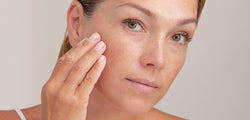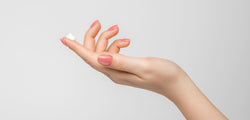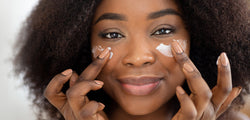
Retinol And Rosacea
Table of Contents:
It is virtually impossible to talk about skin care dilemmas without mentioning retinol and rosacea. Unfortunately, the fact that rosacea is not well-understood by the mainstream public does not help matters either. Even skincare experts are yet to agree unanimously on what exactly causes rosacea and whether or not retinol is an effective treatment option for it.
However, one thing remains undisputable in this rosacea retinol debacle - people with this condition tend to have increased levels of cathelicidins - a certain type of inflammatory proteins - in their skin. If anything, this is what is responsible for the dilated vessels, redness and the typical inflammatory bumps that denote this condition. The relationship between rosacea and retinol becomes even more significant when you factor that the treatments for this condition are hard to come by and most patients managing it would be eager to know whether this revered skincare ingredient can help.
Is Retinol Safe For Rosacea?
It's incredibly hard to tell if indeed you have rosacea or you're just flaring up with another bad acne bout - that's why it is imperative to seek a thorough diagnosis from your dermatologist before attempting to self-treat yourself. Fortunately, the advances that we have made today in skincare technology have made it possible to get this condition under control with minimal or no side-effects at all. A good example is OTC retinol-based topical treatments that have been getting a lot of traction of late, which leads many to asking, 'Is retinol safe to use with rosacea?'
You see, retinol is without a doubt of the most revered and revolutionary skincare ingredients that have changed how we approach treatment of inflammatory acne and other cosmetic conditions. Therefore, it shouldn't come as a surprise that it can be considered one of the worthwhile treatment options for rosacea, right?
The answer is not that straightforward; most rosacea patients hardly tolerate retinol-based skincare products and, in some cases, a retinol-based treatment appears to worsen the situation.
Does Retinol Make Rosacea Worse?

It's only natural for Rosacea patients to be a bit hesitant to apply anything to their skin. Nonetheless, having a chronic skin condition is not an excuse enough to be negligent, sloppy, inattentive and unmindful of your skincare regimen. If anything, this is when you should be more enthusiastic about giving your complexion that much-needed extra attention to minimize the frequency of the flare ups. Skincare is a bit like exercise and nutrition - not a quest for perfection but continuous strife to be better today than yesterday.
Having said that, the most natural question that is probably ringing in your mind at this juncture is, 'Does retinol make rosacea worse?' or 'is retinol bad for rosacea.' To answer these questions as accurately as possible, it's crucial to recognize how retinol works in the first place. Unlike other skin care ingredients like hydroxy acids that employ a bottom-up approach to improve breakout symptoms, retinol works in the opposite direction. In other words, it triggers increased cell turnover with the aim of forcing debris and oil that is trapped underneath the epidermis to rise to the surface for expulsion. And this can look like your symptoms are worsening instead of improving, at least in the short-term. It's known as purging and shouldn't last more than 8 weeks at the most.
By replacing old and worn out skin cells with new ones, retinol can fade off pimples and blackheads and the same can apply to the symptoms that characterize rosacea flare ups. The only difference is that you have to put up with the flare ups getting increasingly worse before they improve for good.
Is Retinol Good For Rosacea?
Some of the hard-to-answer questions that most patients have when it comes to managing this condition is, 'Can you use retinol with rosacea?' and 'Is retinol cream good for rosacea?' To iron out these kinks let it be known from the outset that retinol is among the most effective of all anti-aging and collagen-building serums you can come across. And these two properties will prove to be quite instrumental later on when you need your skin to start generating new epidermal cells that are fed with healthier blood vessels. The end result is usually less flare ups and an overall better-looking appeal in the long run.
Nonetheless, as described earlier, there is a catch. You cannot just start applying retinol-based treatment creams on a rosacea-prone skin without acclimating it to this ingredient and not risk severe flare ups in the first couple of weeks. But by acclimatizing yourself to retinol, you can lessen the severity of the purge break-in phase considerably to the point where it may not worsen your symptoms whatsoever.
The best way of acclimatizing your skin to retinol is by applying it just once a week (or twice at most) for the first month of using a suitable low-potency retinol treatment. You can then bump that up to four times a week as your skin gets used to the complexion-rejuvenation effects of retinol. Alternatively, you can go for a pre-hydrolyzed retinol cream like Maryann’s Organics Retinol that is specially formulated to make it easier for your rosacea-prone skin to tolerate retinol.
Can Retinol Cause Rosacea?

Another pertinent question that never fails to come up when dermatologists are discussing rosacea retinol treatments with their patients is, 'Can retinol cause rosacea?'
Purely scientifically speaking, using retinol cannot trigger rosacea in a patient who has never had the condition in the first place. Although experts are yet to agree on what exactly causes these periodic flare ups, the common consensus is that it has less to do with topical applications and more to do with one's genetic background. In short, what may appear to many first-time using of this skincare ingredient as a retinol triggered rosacea breakout is most probably just the purging effect reported above.
Speaking of which, there are various ways of minimizing skin purging for first-time retinol rosacea patients such as using it alongside a suitable moisturizer to temper its abrasiveness and tone down the cell-regenerative potency.












